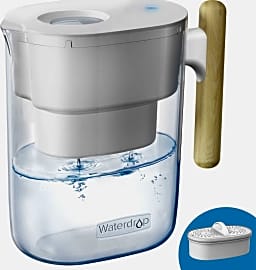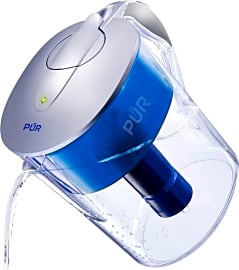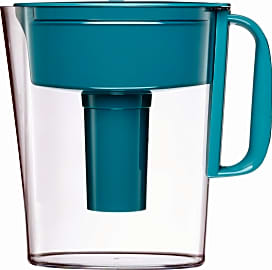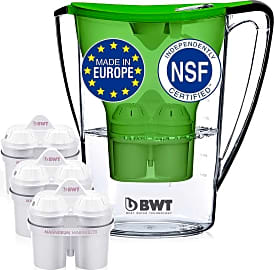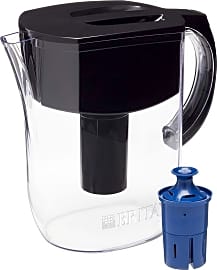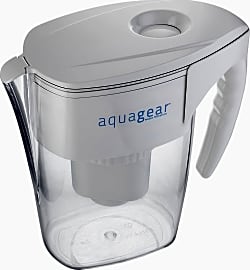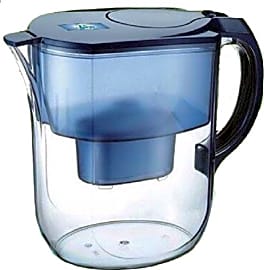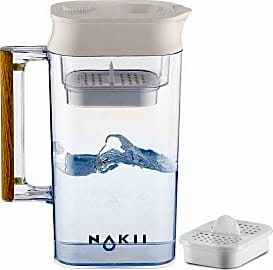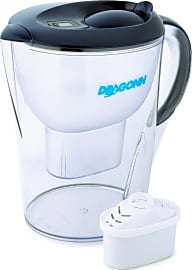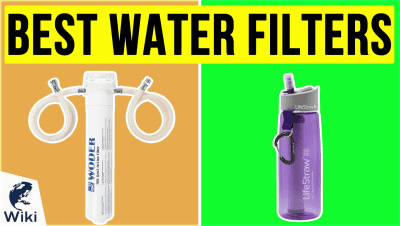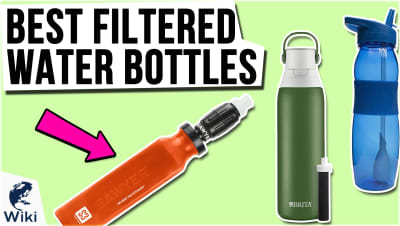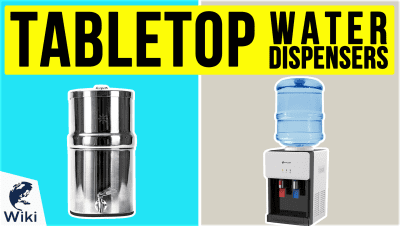The 10 Best Pitcher Water Filters

This wiki has been updated 44 times since it was first published in April of 2015. Drinking enough water is one of the best things you can do for your health — provided that your H2O is clean, of course. These pitcher filters do a great job of ensuring that what you consume is as pure and delicious as possible. Many also claim to boost the immune system, raise energy levels, and more. We'd advise you not to put too much stock in that, but by all means, go back for another glass. When users buy our independently chosen editorial selections, we may earn commissions to help fund the Wiki.
Editor's Notes
July 30, 2021:
We made just a single change to this year's edition of the Wiki. That was replacing a previous Pur model with the upgraded Pur CR1100C, an 11-cup model with a premium construction and LED filter status indicator. The rest of our picks and their ranks haven't changed, with the Plant Based Pros Healthy still in the top spot and the Waterdrop Extream close behind.
February 28, 2020:
Most of us know by now that each day we should consume 64 ounces — or eight glasses — of water. The trouble is, most people opt simply to purchase bottled water, which is not only bad for the environment but bad for your wallet. Others simply drink contaminant-laden tap water straight from the source. Water purifying pitchers offer a simple, affordable solution to help you reach your H2O consumption goals. If a pitcher eats up too much space in your fridge, consider a faucet-mounted filter, or even a filtered water bottle for on-the-go hydration.
The pitchers we've chosen work using a combination of physical and chemical filtration. The filter cartridges often have multiple layers that are designed to remove impurities such as lead, zinc, fluoride, chlorine, salt, and more. The process doesn't just make the water healthier, it also improves its odor and flavor. As an experiment, compare a cup of coffee made with filtered water to coffee brewed with tap water. You'll likely find that the difference in flavor is surprisingly noticeable.
New additions to the list include the Pur PPT111W, Waterdrop Extream, and Plant Based Pros Healthy, which has claimed the number one slot due to its long-lasting filters and sleek, low-profile design. On the other hand, the CamelBak Relay, Oxa Large, and Invigorated Living pH Restore have been removed due to complaints about effectiveness and availability concerns.
Special Honors
ClearlyFiltered Affinity You can't get much more high-tech than this pitcher, which can sift out over 99% of 232 identified contaminants. It's made from medical grade materials, meets multiple National Sanitation Foundation standards for effectiveness, and boasts a 10-cup capacity. clearlyfiltered.com
Vitapur 6-Cup If you happen to live by yourself, this compact model will likely make a welcome addition to your kitchen. It's got a convenient date indicator that lets you know when it's time to change the filter, and it's also quite reasonably priced. homedepot.com
pH Restore Glass It has a stylish cylindrical shape and a robust seven-layer filter that removes heavy metals, sediment, rust, calcification, and more from your drinking water. It's on the pricier end of the spectrum, but it comes with a 60-day money-back guarantee. invigoratedwater.com
So What's All This Crap In My Tap Water?
This shouldn't pose a health risk, but won't exactly enhance your beverage either.
The presence of impurities in tap water hit the headlines at the beginning of 2016 because of the lead poisoning scandal in Flint, Michigan, where a federal emergency was declared after it emerged that water had been contaminated with lead from deteriorating pipes - and that there was a possible link to Legionnaires' disease too.
It's scary stuff, but it's also very unusual. Over 90 percent of the water provided by community water systems in the US meets federal health standards.
So why filter water? What are we filtering out?
Filtering for taste and smell: The most common reason consumers filter their water before drinking it is that they simply don't like the way it tastes straight out of the faucet. This is usually due to chlorine, which municipal water utility companies use to disinfect water and kill off germs. By passing chlorine-treated water through a filter at home, you get all the benefits of safe, treated water without that public pool taste and odor.
Filtering for purity: Another culprit when it comes to water taste is sediment. Although almost all sediment should be filtered from your water before it reaches you, some fine particles may remain. This shouldn't pose a health risk, but won't exactly enhance your beverage either.
Filtering out minerals: You might have noticed that some of the pitchers we've reviewed here promise to filter out metals, like zinc and copper. These minerals will only be present in your water in trace amounts, but they could still impact the taste of your water, and no-one wants their beverage to taste like a tip jar.
Filtering for 'softness': If your tea kettle has ever produced a white furry build-up on the interior, or your glassware has come out of the dishwasher with spots, or if your bathtub is currently caked with white scum, hard water is probably the culprit. It also dries out your skin and hair in the shower, because this water is full of minerals. Soft water is like rain water, pure and clear. In the case of water filters, the filter traps all those minerals, turning hard water into soft water.
How Do I Get Rid Of It?
Different varieties of filter will get the different kinds of unpleasant materials out of your water. Because of this, many filter pitchers use more than one filtration process at once. Here's the lowdown:
Just don't forget to change the filter regularly - otherwise you could find black particles of carbon in your glass, which would kinda negate the point of filtering it.
An activated carbon filter is great at reducing chlorine and sediment, and improving taste and smell. Activated carbon includes not only our good ol' friend charcoal, but also filters made out of coconut. Through a combination of physical and chemical filtration, a good carbon filter will remove almost all the chlorine and fine particles of sediment from your water to leave you with a tasty, clean-smelling beverage. Just don't forget to change the filter regularly - otherwise you could find black particles of carbon in your glass, which would kinda negate the point of filtering it.
An ion exchange filter will reduce water 'hardness and heavy metals'. Pitchers containing this kind of filter are great if you're planning to use your filtered water to make tea or coffee, as the limescale in hard water can affect your kettle or coffee maker over time.
Of course, some filters remove more trace minerals than others. If you're concerned about the effects of trace metals like copper or zinc, check out a report on what's in your local water before picking out a filter pitcher from our list above based on what they're able to remove.
Your Glass Of Water: A History
Water is necessary for any living thing to survive, so it's no surprise that humans have been trying to make water safer and more pleasant to drink since the earliest civilizations.
Hippocrates - he of 'oath' fame - invented something called the 'Hippocratic sleeve': it sounds to us like the name of an indie band but it was actually an early, crude water purifier, made of cloth, which was used to treat water before he gave it to his patients.
It was at this point that chlorine was first used to treat public drinking water.
In the 16th century, Sir Francis Bacon conducted the first scientific experiments in water filtration, in which he tried to use sand to filter the salt out of seawater. The bad news: obviously, this didn't work. The good news: it paved the way for further research.
A Scottish engineer pioneered the first water filtration plant, in 19th century Paisley: we'd suggest that this came about by accident while attempting a new method for distilling whisky, but that would of course be a slur against the inventive and industrious people of Scotland.
This practice of treating water became commonplace across the United Kingdom, particularly after the link between dirty water and cholera was highlighted by the physician John Snow in 1855. It was at this point that chlorine was first used to treat public drinking water.
Increasingly high-standard clean water legislation was passed over the next century in Europe and the US, culminating in America in the 1972 Safe Drinking Water Act.
Brita is arguably the oldest manufacturer of water filters still around today - the German company was founded in 1966. But numerous competitors have emerged since then, as more and more consumers have turned to household water filter pitchers to provide their choice of tasty water to the family.


